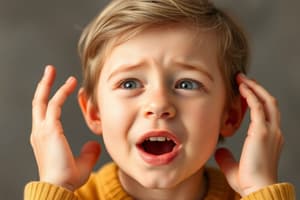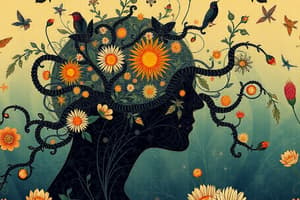Podcast
Questions and Answers
What is motivation?
What is motivation?
- A complex behavior that is learned
- An instinct that directs behavior
- A need or desire that energizes and directs behavior (correct)
- A resting state of energy expenditure
What does instinct refer to?
What does instinct refer to?
A complex behavior that is rigidly patterned throughout a species and is unlearned
What is drive-reduction theory?
What is drive-reduction theory?
The idea that a physiological need creates an aroused tension state (a drive) that motivates an organism to satisfy the need
Define homeostasis.
Define homeostasis.
What is an incentive?
What is an incentive?
What is Maslow's hierarchy of needs?
What is Maslow's hierarchy of needs?
What is glucose?
What is glucose?
What does set point refer to?
What does set point refer to?
Define basal metabolic rate.
Define basal metabolic rate.
What is anorexia nervosa?
What is anorexia nervosa?
What characterizes bulimia nervosa?
What characterizes bulimia nervosa?
What is binge-eating disorder?
What is binge-eating disorder?
What are the stages of the sexual response cycle?
What are the stages of the sexual response cycle?
What is a refractory period?
What is a refractory period?
What role do estrogens play?
What role do estrogens play?
What is testosterone?
What is testosterone?
Define sexual orientation.
Define sexual orientation.
What is emotion?
What is emotion?
What does the James-Lange theory propose?
What does the James-Lange theory propose?
What does the cannon-bard theory state?
What does the cannon-bard theory state?
What is the two-factor theory?
What is the two-factor theory?
What is a polygraph?
What is a polygraph?
What is facial feedback?
What is facial feedback?
Define catharsis.
Define catharsis.
What is the feel-good, do-good phenomenon?
What is the feel-good, do-good phenomenon?
What does well-being refer to?
What does well-being refer to?
Study Notes
Motivation
- Defined as a need or desire that energizes and directs behavior.
- Drives human actions and decisions towards goal fulfillment.
Instinct
- A complex and unlearned behavior, consistently patterned among species.
Drive-Reduction Theory
- Proposes that physiological needs create an aroused tension state, or drive, leading to behaviors aimed at satisfying those needs.
Homeostasis
- The body's natural tendency to maintain a stable internal environment, regulating variables like blood glucose.
Incentive
- Refers to environmental stimuli that can be positive or negative, motivating individuals to act.
Hierarchy of Needs
- Maslow's model categorizes human needs into a pyramid, with basic physiological needs at the base, followed by safety, then psychological needs.
Glucose
- A primary form of sugar in the blood, serving as the main energy source for body tissues. Low levels trigger feelings of hunger.
Set Point
- The predetermined body weight that the body tries to maintain through mechanisms that increase hunger and lower metabolism if weight is lost.
Basal Metabolic Rate
- Indicates the resting rate of energy expenditure by the body when at rest, crucial for understanding energy balance.
Anorexia Nervosa
- An eating disorder characterized by extreme weight loss (15% or more underweight) due to self-starvation paired with a distorted body image.
Bulimia Nervosa
- Involves episodes of excessive eating followed by purging behaviors such as vomiting or excessive exercise to avoid weight gain.
Binge-Eating Disorder
- Characterized by significant binge-eating episodes accompanied by feelings of distress but without compensatory purging behaviors.
Sexual Response Cycle
- Describes four stages of sexual arousal: excitement, plateau, orgasm, and resolution, as outlined by Masters and Johnson.
Refractory Period
- A time following orgasm during which a male cannot achieve another orgasm.
Estrogens
- Female sex hormones like estradiol that are predominant in females and play roles in female sexual characteristics and reproductive cycles.
Testosterone
- The principal male sex hormone that promotes male physical development and characteristics.
Sexual Orientation
- Represents an enduring sexual attraction towards one’s own sex (homosexual) or the opposite sex (heterosexual).
Emotion
- A comprehensive response involving physiological arousal, expressive behaviors, and conscious experiences.
James-Lange Theory
- Suggests that emotions arise from awareness of physiological responses to stimuli.
Cannon-Bard Theory
- Posits that emotion-arousing stimuli trigger both psychological responses and subjective emotional experiences simultaneously.
Two-Factor Theory
- Schachter-Singer’s model states that experiencing emotion requires both physical arousal and cognitive labeling of that arousal.
Polygraph
- A machine that measures physiological responses, such as heart rate and perspiration, to detect lies and emotional states.
Facial Feedback
- Highlights how facial expressions can enhance or intensify emotional experiences, linking physical expressions with feelings.
Catharsis
- Refers to emotional release, suggesting that expressing aggressive feelings can alleviate urges to act aggressively.
Feel-Good, Do-Good Phenomenon
- The tendency for individuals to be more helpful when they are in a positive mood.
Well-Being
- Associated with self-perceived happiness and overall satisfaction with life.
Studying That Suits You
Use AI to generate personalized quizzes and flashcards to suit your learning preferences.
Description
Test your knowledge on the key concepts of motivation and emotion in AP Psychology with these flashcards. Each card covers important terms and definitions to help solidify your understanding of psychological theories and terms related to motivation. Perfect for exam preparation!




